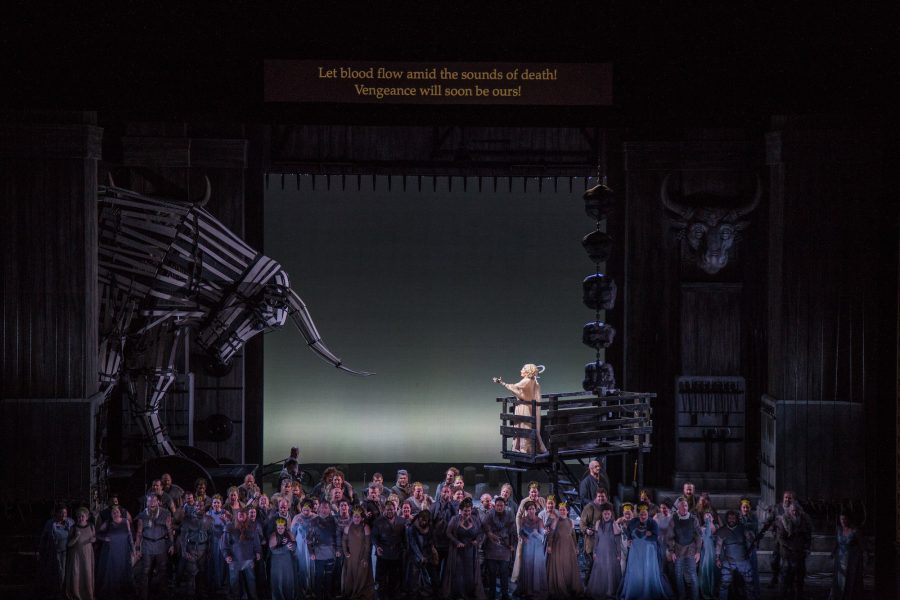Norma’: an opera full of lyrical woes
Filled with plot twists and tension, “Norma” is playing now at the Lyric Opera of Chicago. Tickets can be purchased at the box office or online at www.lyricopera.org.
February 7, 2017
Love, betrayal, bloody fury and vengeance are all topics that can be found in the production of “Norma” by Vincenzo Bellini at the Lyric Opera of Chicago.
The opening scene relays a cruel winter mis-en-scene within Roman occupied Gaul. Faux snow fell in the background as 20 to 30 members of the cast saturated the stage.
The opera, sung in original Italian, centers around Norma, a priestess and prophetess of the temple of the Druid god, whom the cast refers to as “Irminsul.”
The costume and color schemes used in the opera were beautifully depicted. During about 50 BCE, the Druids were enslaved by the Roman Empire according to the storyline. The opera depicted this by dressing the Druids in drab costumes of gray, blue and green hues. Through their clothes alone, I felt the melancholy the actors were trying to communicate to the audience.
Amid the sea of gray, blue and green, Norma wore a golden and ivory gown. It glittered and set her character apart from the rest.
After a bit of research, I discovered that there was a god named Irmin and the altar of worship within his dedicated temple was referred to as Irminsul, which loosely translates to “a pillar that stands high and erect” according to Old Saxon paganism. The god Irmin is never directly named. My only guess is that the name of the god was lost in translation.
The Lyric Opera of Chicago did translate the opera via superscript screens overhead, but it was a little jarring having to constantly look upwards. I was in constant fear that I would miss something important and be completely lost in the massive phrases of the love-language.
Truthfully, it was really easy for me to get completely lost in the opera because of the main ingredient: music.
The orchestra was a beautiful union of instruments playing harmoniously. The orchestra complemented the opera singers and it was hard for me to become distracted. All I wanted to do was listen to the cast’s singing.
Norma experiences love through her husband Pollione, a Roman soldier currently abiding in Gaul. The story has a provoking twist because, according to her vows as a priestess, she is forbidden to take a husband, let alone a lover. The plot thickens after it is revealed that she not only has a husband in Pollione but bore his two children as well.
The plot thickens even more when Pollione confides in his friend Flavio that he is no longer in love with Norma and wants to escape back to Rome with his new love Adalgisa, whom he describes as “young, sweet and innocent.”
Adalgisa is a priestess on the verge of taking her chastity vows in the temple of Irmin. Pollione basically fell in love with a younger version of Norma.
The opera displays one twist after another because Adalgisa loves Pollione in return but ultimately spurns her love for him once she finds out that he spurned his love for Norma. In a rage, Pollione threatens to abduct Adalgisa.
Meanwhile, Norma – in a fury of shame, heartbreak and vengeance – pulls a blade on her children while they are sleeping, intent on killing them because they belong to Pollione, and threatens death against Adalgisa for being the object of his affections.
All the while, the Druids are still enslaved and clamoring for war against the Romans to drive them out of Gaul. The only one who can deliver a so-called declaration of war against the Romans is a prophetess: Norma.
Did I mention that the leader of the Druids calling for war and the death of all Roman soldiers in Gaul is Norma’s father Oroveso?
Whether Norma succeeds or fails in wreaking vengeance against Pollione for breaking her heart, sentencing Adalgisa to certain death, declaring war against Rome or killing her own children are answers I will never tell.
Although I did not know what story to expect, I can honestly say I did not expect this. Despite minor jarring details such as the superscripts, there is nothing quite like “Norma.” I would recommend it to anyone.
There’s still time to see it. The Lyric Opera of Chicago is performing “Norma” until Feb. 24.









Ken Rowland • Feb 19, 2017 at 7:53 am
How can anyone write an Opera review without once mentioning even ONE singer? And…..
what kind of periodical would print such a travesty of an opera review?
The prosecution rests it’s case!
In utter amazement….Ken Rowland